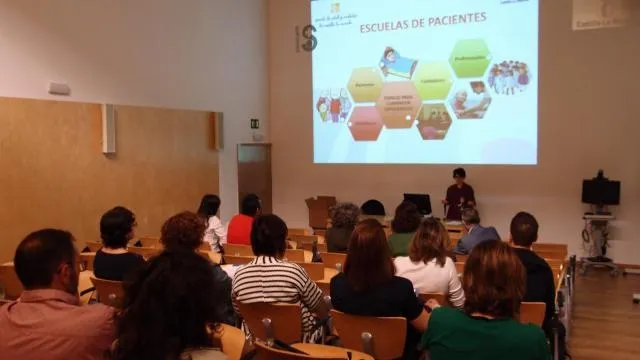The Government of Castilla-La Mancha promotes the formation of diabetes expert patients to expand the School of Health and Care, an initiative that is part of the policies of humanization of healthcare in order that patients and caregivers acquire skills to improveHis personal autonomy in the approach to the disease.
Under this premise, the Training Workshops of Diabetes, which will boost the mutual aid network in all basic health areas, have been developed in the Integrated Management of Integrated Care.It is the first time that these courses are held at the General University Hospital of Ciudad Real, since so far the training had been taught at the Institute of Health Sciences of Talavera (Toledo).
The School of Health and Care of Castilla-La Mancha develops in two phases.In the first, which has been developed in the last month in Ciudad Real, patients and professionals are formed who will be responsible for coordinating the program in their health areas.In these courses, participants receive training on pathology, their care and develop communication skills to later be trained to impart the training of patients and relatives who request it.
In the second phase, the workshop is organized with the support of a healthcare professional to offer theoretical and practical training on the disease to unpalled patients.
The ultimate goal is to create a network of trainers who transmit their experiences and knowledge to other patients who have the same pathology, making possible the training and involvement of patients with chronic disease and their relatives to improve their health and quality of life.
The School of Health and Care in Diabetes adds to the different initiatives of the Ministry of Health of Castilla-La Mancha aimed at improving the patient's quality of life with a chronic disease, of which 13 percent suffer diabetes.
Among the measures launched are the gratuity of the continuous glucose monitoring system for minors or the creation from the Castilla-La Mancha health service of a multidisciplinary working group that works in the elaboration of a common strategy forThe pharmacotherapeutic approach of the patient with type II diabetes mellitus.
Castilla-La Mancha, a year of free for minors with diabetes
On October 1 of last year, the free glucose monitoring system for minors was implemented in Castilla-La Mancha, within the products financed by the regional public system, that is, without cost to families.In this way, Castilla-La Mancha became the first autonomous community that facilitates this care provision in our country.
A measure, in which the regional government has invested a million euros and from which the nearly 700 minors with type 1 diabetes can be benefited, with ages between 4 and 17 years.
This system allows continuous control of the blood glucose level through patches placed on the skin, thus avoiding having to perform the usual daily punctures to check the sugar values.The patch is placed on the arm and the information collected can be read well through an coupled machine or even through ‘smartphones’ applications.
The Government of Castilla-La Mancha has decided to expand the group of subsidiary patients to benefit from the financing of this benefit with the incorporation of blind diabetic users, women with gestational diabetes in insulin treatment, in addition to financing the device both to those patients whoThey turn 18 and that they were alreadyUsing this this monitoring system such as those that debut with diabetes with age of 18 years.


